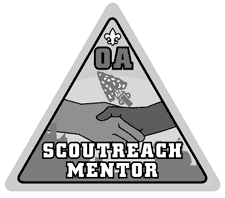Order of the Arrow Scoutreach Mentoring Program

The Order of Arrow Scoutreach Mentoring Program is a joint effort of the national Scoutreach Division of the Boy Scouts of America and the Order of the Arrow. Its purpose is to identify and assist urban and rural Scout troops whose camping and advancement programs are below standard.
Functions
- To act as a positive change agent in the midst of startling social, political, economic, and demographic events affecting urban and rural Scouts.
- To increase advancement and camping opportunities for Scouts in urban and rural troops whose programs might be insufficient.
- To fulfill the Order of the Arrow Strategic Plan.
- To create the opportunity for more urban and rural Scouts to become eligible for membership in the Order of the Arrow.
- To provide additional, positive youth and adult role models for disadvantaged urban and rural Scouts and adult leaders.
- To create a "guided discovery" for Order of the Arrow members to reflect on the ideal of "He alone is worthy to wear the arrow who will continue faithfully to serve his fellow man."
Responsibility and Authority
It is the overall responsibility of the lodge with local Scoutreach and district committee support to administer the Order of the Arrow Scoutreach Mentoring Program. This comes about through the lodge service committee. Regardless of the size of the lodge and its internal structure, the lodge service committee has the authority for administering the program. The lodge service committee should request assistance from the council and district commissioner's staff, council professionals, and the council's Scoutreach committee in identifying urban and rural troops whose advancement and camping program are weak or nonexistent.
Other sources within the council where information on a troop's status might be obtained are the record of district and council camping and advancement committees. Therefore, it becomes necessary that the lodge service committee develop a master profile of urban and rural troops in the council that might benefit from the mentoring program. From the master profile, the lodge service committee and district executive will match applicants to selected troops.
The lodge service committee and the district commissioner should exercise great care in matching mentors to troops. Troops whose camping and advancement programs are weakest would require the most assistance. In such cases, two or more mentors might be assigned to a single troop. Keep in mind that matching mentors to troops will vary from troop to troop.
Application Process
Interested Arrowmen should secure an application from the lodge. The application should then be completed carefully and returned to the chair of the lodge service committee. The lodge service committee and the commissioner staff serving the district where the troops are located will meet to review all applications. Selected mentors will then be matched to a troop as identified from the master profile of urban and rural troops.
Introduction of Mentors and Needs Assessment
- District unit commissioner introduces mentor to troop leaders.
- Mentor and troop leaders assess the troop's advancement and camping needs.
- Mentor and troop leaders develop a written action plan for achieving the needs of the troop.
The application form may be downloaded from this site.
Implementation
Carrying out the action plan is the implementation phase of the program. The action plan is determined by the troop's advancement and camping program; however, the advancement and camping programs of some urban and rural troops might be stronger or weaker than others. Troops with the weakest programs will most often require more time, resources, and additional mentors; therefore, action plans should be developed to accommodate such inconsistency.
Evaluation
Once the action plan has been carried out, the mentor, troop leaders, and district commissioner meet to evaluate the mentor 's performance and to discuss whether the action plan was fulfilled. The evaluation process is required and should not be omitted under any circumstance.
In the evaluation process, several things should be addressed. First, did the mentor set a good example in wearing the uniform? Did the mentor demonstrate the Scouting ideals and the Order of the Arrow obligation? Was the mentor a good role model for urban and rural Scouts? Did the mentor learn anything from this process? Did the action plan work? What worked and what didn't? Did the troop's advancement and camping program show improvement?
One excellent indicator of improvement in the troop's advancement program is the percentage of troop members advancing or achieving First Class or above. As for camping, two good gauges are (1) the number of Scouts present on campouts and (2) the number of days and nights the troop went camping. What about the troop's attitude about short- and long-term camping before and after the mentoring process? Can the mentor cite examples of troop members talking or inquiring about summer camp? Philmont? Other high adventure opportunities? What about membership in the Order of the Arrow?
Recognition
This final phase of the Order of the Arrow Scoutreach Mentoring Program is an opportunity to recognize mentors for their diligent efforts in assisting urban and rural troops. Before recognition is granted, mentors must have the approval of the urban or rural Scoutmaster, lodge chief, lodge adviser, lodge service committee chairman, and district commissioner. Once approvals are granted, the Scout executive will forward applications to the national Scoutreach Division. The national Scoutreach Division will forward patches and certificates to the Scout executive for presentation.
The Order of the Arrow Scoutreach Mentor Award consists of a colorful triangular patch and certificate. Mentors who successfully complete their first action plans and have received application approval are presented patches and certificates with a bronze border. Mentors completing action plans for a second time, with application approval, are presented patches and certificates with a silver border. Finally, mentors completing action plans and approved for a third time are presented patches and certificates with a gold border.